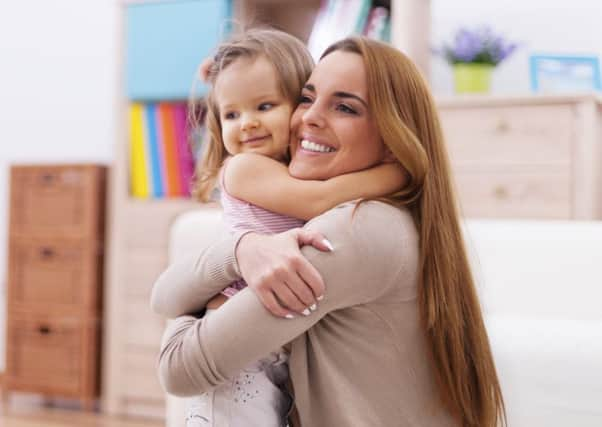Suzanne Zeedyk: Cuddles count for more with kids


I’m going to start by saying something that often turns out to be controversial, though I never quite understand why. I believe that it should be national policy that everyone looking after children and making decisions about children should have robust training in the science of attachment.
Too few people realise how ordinary actions impact on children’s brain development. This means that the way we currently care for children can cause damage we don’t recognise.
Advertisement
Hide AdAdvertisement
Hide AdWhat does the science tell us? Touch, from someone you trust, produces feel-good hormones like oxytocin. That hormone helps us cope with physical and emotional pain.
A good example where this knowledge can be applied is at the beginning of the day when children are dropped off at nursery.
Cuddles help a child to handle that painful separation from a parent. The distress is a natural part of our human attachment system.
A trusted key worker needs to be on hand, ready to wrap the child in their arms, as they come to terms with parting from mum or dad. The oxytocin released in that cuddle will help the child to cope with feelings of loss and sadness. The stress hormone, cortisol, will drop. Children can then come to learn that that someone is on hand when they are feeling sad. That sense of trust they are developing in relationships which will be very important for the friends and partners they will have later in life. They are learning that when they are in pain, they can seek out help and do not have to cope alone. Difficulty in seeking help when you are struggling emotionally causes mental ill-health.
This is all basic science and no longer really controversial. What is controversial is its application. We are nervous about touch in our society. The risks associated with ‘inappropriate touch’ have made adults scared, and we have a whole range of policies that reinforce that fear. We think we are protecting children by guarding against touch. Teachers are forbidden to touch children’s shoulders; classroom assistants can’t put on sunscreen. We don’t often consider we might be causing harm by withholding touch.
It’s not unusual to have childcare staff say to me: “We offer cuddles if a child asks for them, but only when they initiate it.” That sounds positive, because it sounds like the child is in control. The risk is that a child learns that when they are in emotional pain, no-one is on hand to offer comfort unsolicited. They can end up feeling ignored and isolated, even though that is not what we intended.
Separation is a form of loss. Every morning children in nursery and school experience loss. Left to deal with it on their own, we weaken their emotional muscles. We might think we are teaching a child to be independent but are actually teaching them to cope with loss alone.
The explosion in neuroscience over the past decade means that we have a much deeper understanding of children’s development. We have a better chance of achieving our aim of promoting the best outcomes for children. But we can’t do that unless every single policymaker, service manager and practitioner has a robust understanding of the science of attachment.
Advertisement
Hide AdAdvertisement
Hide AdGovernment policy currently advocates increased childcare hours, a priority for helping parents back into work. In my view, this exacerbates the need for attachment training. If babies are in childcare for 30+ hours per week without cuddles and affection, then their development will be negatively impacted. We undermine their emotional resilience. That is hard to face up to: that our childcare policies could be damaging in ways we had not intended or realised.
The Nobel prize-winning economist, Professor James Heckman reminds us that “adult services” we fund -- prisons, health, mental and social services – have direct links to early years experiences. When we don’t invest in high-quality early years services, we don’t just hurt “service users”. We hurt ourselves, because we have to spend more money coping with the consequences of early emotional distress and trauma.
Nicola Sturgeon is doing a lot to advocate for the needs of young children and families. She is calling for an increase in government-funded childcare hours. However, if we don’t pay attention to children’s attachment needs, this new policy could have outcomes we never intended.
So, Nicola, let’s make sure that our political decisions are informed by the latest insights of attachment and the science of brain development.
I really want Scotland to be best place in the world to grow up. That’s not possible unless we make sure our kids are getting enough cuddles.
• Suzanne Zeedyk is currently senior lecturer in developmental psychology at the University of Dundee. She will be speaking at the IFDCO Conference, 22-25 July, Edinburgh, co-organised and hosted by Children in Scotland and the Scottish Childminding Association.